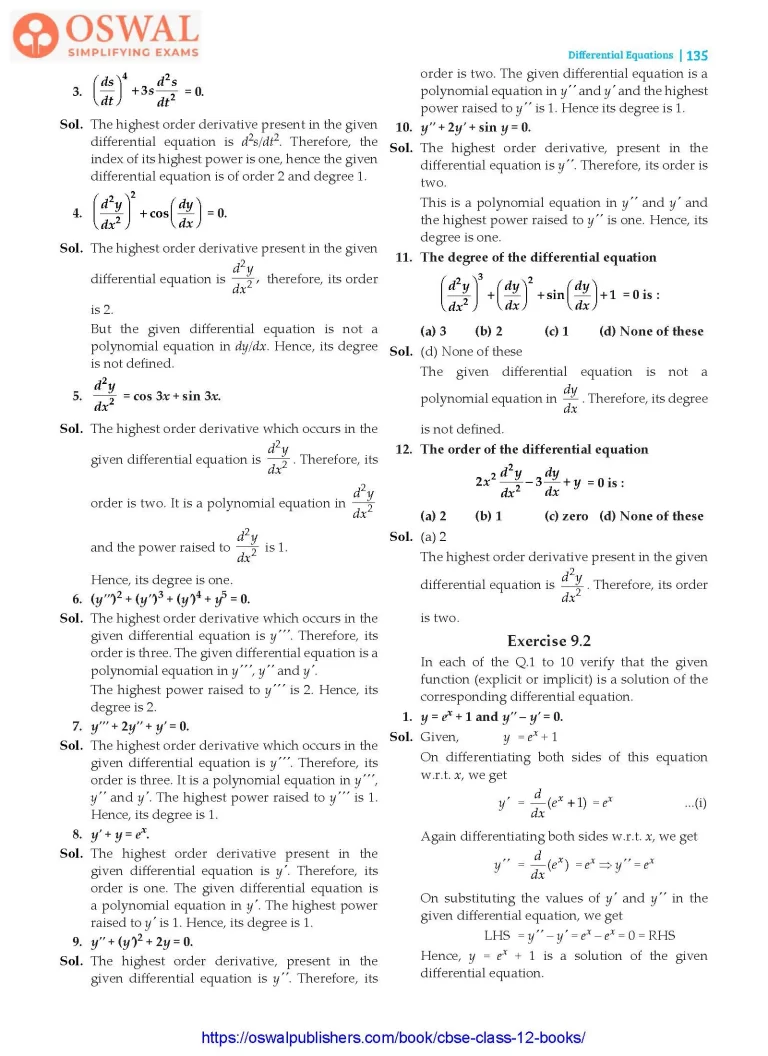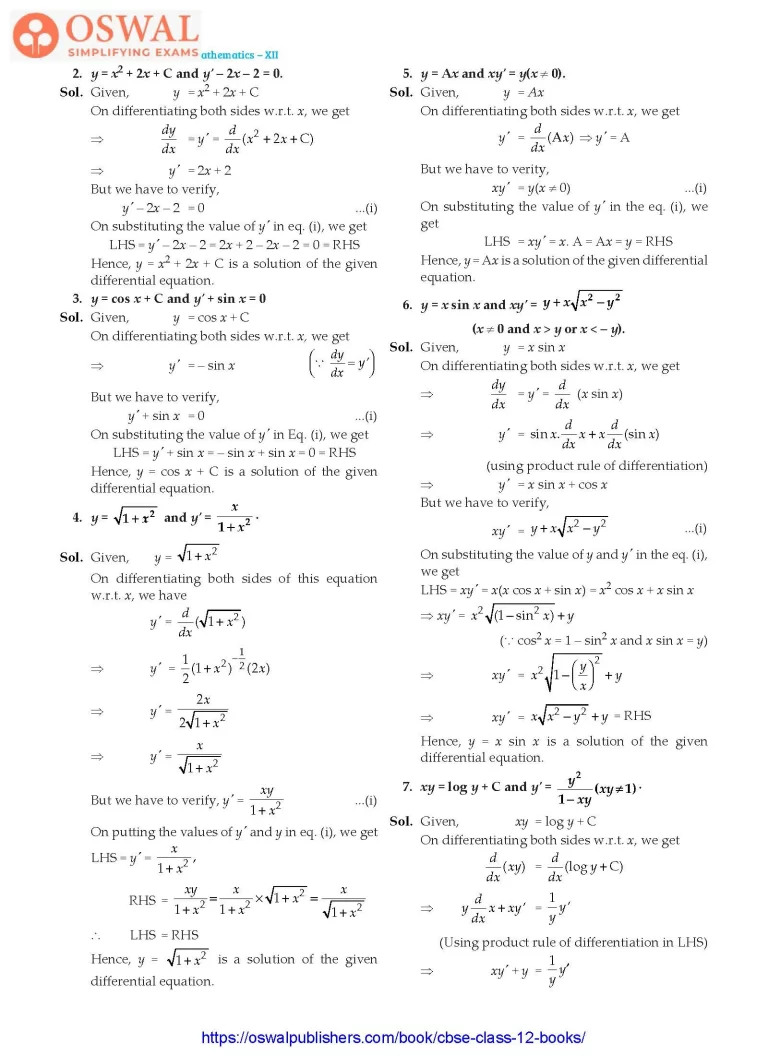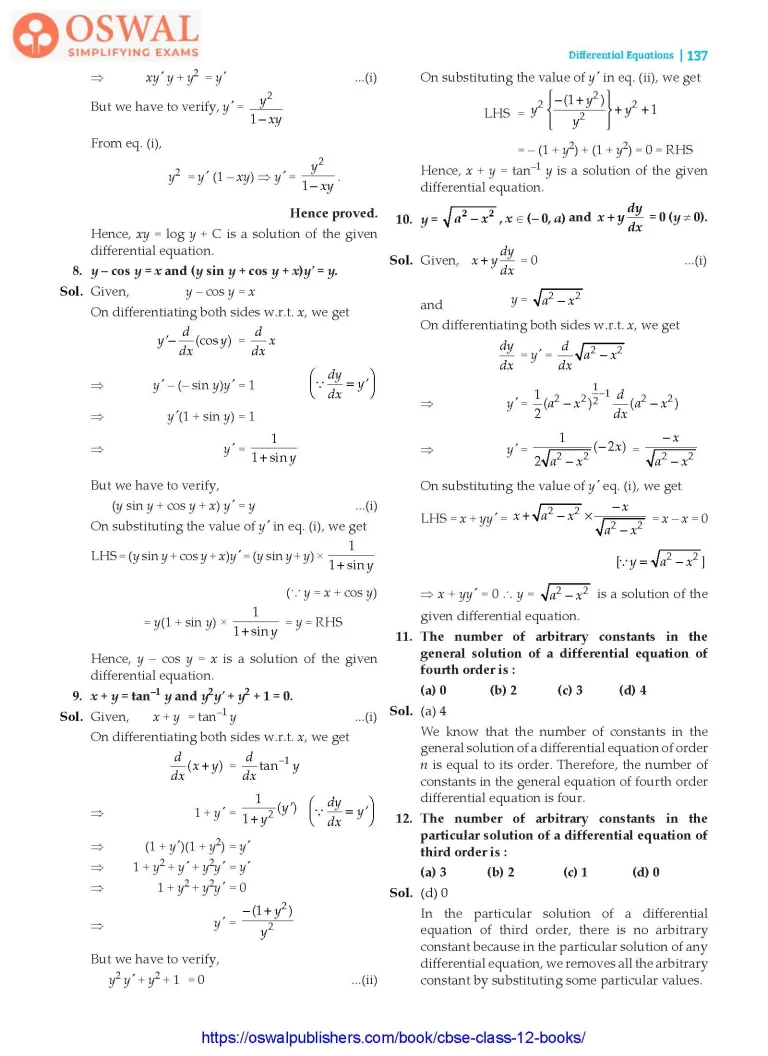NCERT Solutions for Class 12 Maths Chapter 9 - Differential Equations - Exercise 9.2



Access Exercises of Class 12 Maths Chapter 9 – Differential Equations
Exercise 9.1 Solutions 12 Questions
Exercise 9.2 Solutions 12 Questions
Exercise 9.3 Solutions 12 Questions
Exercise 9.4 Solutions 23 Questions
Exercise 9.5 Solutions 17 Questions
Exercise 9.6 Solutions 19 Questions
Miscellaneous Exercise on Chapter 9 Solutions 18 Questions
Exercise 9.2
In each of the Q.1 to 10 verify that the given function (explicit or implicit) is a solution of the corresponding differential equation.
1. y = ex + 1 and y'' – y' = 0.
Sol. Given, y = ex + 1
On differentiating both sides of this equation w.r.t. x, we get
$$y'=\frac{d}{dx}(e^{x}+1)=e^{x}\space\text{...(i)}$$
Again differentiating both sides w.r.t. x, we get
$$y'' =\frac{d}{dx}(e^{x})=e^{x}\\\Rarr\space y''= e^{x} $$
On substituting the values of y' and y'' in the given differential equation, we get
LHS = y'' – y' = ex – ex = 0 = RHS
Hence, y = ex + 1 is a solution of the given differential equation.
2. y = x2 + 2x + C and y' – 2x – 2 = 0.
Sol. Given, y = x2 + 2x + C
On differentiating both sides w.r.t. x, we get
$$\Rarr\space\frac{dy}{dx}=y'=\frac{d}{dx}(x^{2} + 2x+ C)\\\Rarr\space y' = 2x+2$$
But we have to verify,
y' – 2x – 2 = 0 ...(i)
On substituting the value of y' in eq. (i), we get
LHS = y' – 2x – 2 = 2x + 2 – 2x – 2 = 0 = RHS
Hence, y = x2 + 2x + C is a solution of the given differential equation.
3. y = cos x + C and y' + sin x = 0
Sol. Given, y = cos x + C
On differentiating both sides w.r.t. x, we get
$$\Rarr\space y'= -\text{sin x}\\\bigg(\frac{dy}{dx}= y'\bigg)$$
But we have to verify,
y' + sin x = 0 ...(i)
On substituting the value of y' in Eq. (i), we get
LHS = y' + sin x = – sin x + sin x = 0 = RHS
Hence, y = cos x + C is a solution of the given differential equation.
$$\textbf{4. y = }\sqrt{\textbf{1 + x}^{\textbf{2}}}\textbf{and y' =}\frac{\textbf{x}}{\textbf{1+x}^{\textbf{2}}}.\\\textbf{Sol.\space}\text{y = }\sqrt{1 + x^{2}}$$
On differentiating both sides of this equation w.r.t. x, we have
$$y'=\frac{d}{dx}(\sqrt{1 + x^{2}})\\\Rarr\space y' = \frac{1}{2}(1+x^{2})^{-\frac{1}{2}}(2x)\\\Rarr\space y'=\frac{2x}{2\sqrt{1+x^{2}}}\\\Rarr\space y'=\frac{x}{\sqrt{1+x^{2}}}\\\text{But we have to verify, y' =}\frac{xy}{1+x^{2}}\space\text{...(i)}$$
On putting the values of y' and y in eq. (i), we get
$$\text{LHS = y' =}\frac{x}{1+x^{2}},\\\text{RHS = }\frac{xy}{1+x^{2}}\\=\frac{x}{1+x^{2}}×\sqrt{1+x^{2}}=\frac{x}{\sqrt{1+x^{2}}}$$
∴ LHS = RHS
$$\text{Hence.\space} y=\sqrt{1+x^{2}}\space\text{is a solution of the}\\\text{given differential equation.}$$
5. y = Ax and xy' = y(x ≠ 0).
Sol. Given, y = Ax
On differentiating both sides w.r.t. x, we get
$$y'=\frac{d}{dx}(Ax)\Rarr\space \text{y'= A}$$
But we have to verity,
xy' = y(x ≠ 0) ...(i)
On substituting the value of y' in the eq. (i), we get
LHS = xy' = x. A = Ax = y = RHS
Hence, y = Ax is a solution of the given differential equation.
$$\textbf{6.\space y = x sin x\space and xy'=y + x}\sqrt{\textbf{x}^{\textbf{2}}\textbf{-}\textbf{y}^{\textbf{2}}}$$
$$\textbf{(x}\neq \textbf{0 and x}\text{\textgreater}\textbf{y}\space \textbf{or}\space \textbf{x}\text{\textless} \textbf{-y).}$$
Sol. Given, y = x sin x
On differentiating both sides w.r.t. x, we get
$$\Rarr\space\frac{dy}{dx}= y'=\frac{d}{dx}\text{x sin x}\\\Rarr\space y' = \text{sin x}.\frac{d}{dx} x + x\frac{d}{dx}(\text{sin x})$$
(using product rule of differentiation)
$$\Rarr\space \text{y' = x sin x + cos x}$$
But we have to verify,
$$xy'= y+x\sqrt{x^{2}-y^{2}}\space\text{...(i)}$$
On substituting the value of y and y' in the eq. (i), we get
LHS = xy' = x(x cos x + sin x) = x2 cos x + x sin x
$$\Rarr\space xy' = x^{2}\sqrt{(1 - \text{sin}^{2}x)}+y$$
(∵ cos2 x = 1 – sin2 x and x sin x = y)
$$\Rarr\space xy' = x^{2}\sqrt{1 - \bigg(\frac{y}{x}\bigg)^{2}}+y\\\Rarr\space xy' = x\sqrt{x^{2}-y^{2}}+y \space \text{= RHS} $$
Hence, y = x sin x is a solution of the given differential equation.
$$\textbf{7. xy = log y + C and}\\\space\textbf{y' =}\frac{\textbf{y}^{\textbf{2}}}{\textbf{1-xy}}(\textbf{xy}\neq\textbf{1).}$$
Sol. Given, xy = log y + C
On differentiating both sides w.r.t. x, we get
$$\frac{d}{dx}(xy) = \frac{d}{dx}(log\space y + \text{C})\\\Rarr\space y\frac{d}{dx}x + xy' = \frac{1}{y}y'$$
(Using product rule of differentiation in LHS)
$$\Rarr\space xy'+ y=\frac{1}{y}y'\\\Rarr\space xy' + y + y^{2} = y'\space\text{...(i)}\\\text{But we have to verify, y' =}\frac{y^{2}}{1-xy}\\\text{From eq. (i),}\\\text{y}^2\text{ = y' (1 – xy)}\\\Rarr\space y'=\frac{y^{2}}{1-xy}.$$
Hence proved.
Hence, xy = log y + C is a solution of the given differential equation.
8. y – cos y = x and (y sin y + cos y + x)y' = y.
Sol. Given, y – cos y = x
On differentiating both sides w.r.t. x, we get
$$y'-\frac{d}{dx}(cos \space y) = \frac{d}{dx}x\\\Rarr\space y'-(- sin \space y)y'=1\\\bigg(\because\space \frac{dy}{dx} = y'\bigg)\\\Rarr\space y'(1 + sin \space y)=1\\\Rarr\space y' = \frac{1}{1 + sin\space y}$$
But we have to verify,
(y sin y + cos y + x) y' = y ...(i)
On substituting the value of y' in eq. (i), we get
LHS = (y sin y + cos y + x)y'=
$$(y \space sin\space y + y)×\frac{1}{\text{1 + sin y}}$$
(∵ y = x + cos y)
$$ = y(1 + sin y)×\frac{1}{\text{1 + sin y}}\\\text{= y = RHS}$$
Hence, y – cos y = x is a solution of the given differential equation.
$$\textbf{9.\space x + y = tan}^{\normalsize-1}\textbf{y}\space \textbf{and}\space \textbf{y}^{\textbf{2}}\textbf{y' + y}^{\textbf{2}} \textbf{+ 1 = 0.}$$
Sol. Given, x + y = tan–1 y ...(i)
On differentiating both sides w.r.t. x, we get
$$\frac{d}{dx}(x+y) = \frac{d}{dx}\text{tan}^{\normalsize-1}y\\\Rarr\space 1+y' = \frac{1}{1+y^{2}}(y')\\\bigg(\because\space \frac{dy}{dx} = y'\bigg)$$
$$\Rarr (1 + y')(1 + y^2) = y' \\\Rarr 1 + y^2 + y' + y^2y' = y'\\\Rarr 1 + y^2 + y^2y' = 0\\\Rarr\space y' = \frac{-(1 + y^{2})}{y^{2}}$$
But we have to verify,
y2 y' + y2 + 1 = 0 ...(ii)
On substituting the value of y' in eq. (ii), we get
$$\text{LHS = y}^{2}\begin{Bmatrix}\frac{-(1+y^{2})}{y^{2}}\end{Bmatrix}+y^{2}+1$$
= – (1 + y2) + (1 + y2) = 0 = RHS
Hence, x + y = tan–1 y is a solution of the given differential equation.
$$\textbf{10.\space y = }\sqrt{\textbf{a}^{\textbf{2}}\textbf{- x}^{\textbf{2}}}\space\textbf{,\space x}\epsilon \textbf{(-0,a)}\space\\\textbf{x + y}\frac{\textbf{dy}}{\textbf{dx}}\textbf{= 0}\space\textbf{(y}\neq\textbf{ 0).}\\\textbf{Sol.\space}\text{Given}\space x + y\frac{dy}{dx}=0\qquad\text{...(i)}\\\text{and}\space y=\sqrt{a^{2}-x^{2}}$$
On differentiating both sides w.r.t. x, we get
$$\text{LHS = x + yy' = x + }\sqrt{a^{2}-x^{2}}×\frac{-x}{\sqrt{a^{2}-x^{2}}}$$
= x – x = 0
$$\lbrack\because\space y = \sqrt{a^{2}-x^{2}}\rbrack\\\Rarr\space x + yy' = 0\space\therefore\space y = \sqrt{a^{2}-x^{2}}$$
is a solution of the given differential equation.
11. The number of arbitrary constants in the general solution of a differential equation of fourth order is :
(a) 0
(b) 2
(c) 3
(d) 4
Sol. (a) 4
We know that the number of constants in the general solution of a differential equation of order n is equal to its order. Therefore, the number of constants in the general equation of fourth order differential equation is four.
12. The number of arbitrary constants in the particular solution of a differential equation of third order is :
(a) 3
(b) 2
(c) 1
(d) 0
Sol. (d) 0
In the particular solution of a differential equation of third order, there is no arbitrary constant because in the particular solution of any differential equation, we removes all the arbitrary constant by substituting some particular values.
Share page on
NCERT Solutions Class 12 Mathematics
- Chapter 1 Relations and Functions
- Chapter 2 Inverse Trigonometric Functions
- Chapter 3 Matrices
- Chapter 4 Determinants
- Chapter 5 Continuity and Differentiability
- Chapter 6 Application of Derivatives
- Chapter 7 Integrals
- Chapter 8 Applications of the Integrals
- Chapter 9 Differential Equations
- Chapter 10 Vectors
- Chapter 11 Three-Dimensional Geometry
- Chapter 12 Linear Programming
- Chapter 13 Probability
CBSE CLASS 12 NCERT SOLUTIONS
- NCERT Solutions Class 12 English Core
- NCERT Solutions Class 12 Physics
- NCERT Solutions Class 12 Chemistry
- NCERT Solutions Class 12 Biology
- NCERT Solutions Class 12 Business Studies
- NCERT Solutions Class 12 Mathematics
- NCERT Solutions Class 12 Accountancy
- NCERT Solutions Class 12 Economics
- NCERT Solutions Class 12 Geography
- NCERT Solutions Class 12 History
- NCERT Solutions Class 12 Political Science
CBSE CLASS 12 SYLLABUS
- CBSE Class 12 English core Syllabus
- CBSE Class 12 Mathematics Syllabus
- CBSE Class 12 Physics Syllabus
- CBSE Class 12 Chemistry Syllabus
- CBSE Class 12 Biology Syllabus
- CBSE Class 12 Accountancy Syllabus
- CBSE Class 12 Business Studies Syllabus
- CBSE Class 12 Economics Syllabus
- CBSE Class 12 History Syllabus
- CBSE Class 12 Geography Syllabus
- CBSE Class 12 Political science Syllabus
- CBSE Class 12 Sociology Syllabus
- CBSE Class 12 Psychology Syllabus
- CBSE Class 12 Physical education Syllabus
- CBSE Class 12 Applied mathematics Syllabus
- CBSE Class 12 History of Indian Arts Syllabus
CBSE CLASS 12 Notes
- CBSE Class 12 Physics Notes
- CBSE Class 12 Chemistry Notes
- CBSE Class 12 Biology Notes
- CBSE Class 12 Maths Notes
- CBSE Class 12 Accountancy Notes
- CBSE Class 12 Business Studies Notes
- CBSE Class 12 Economics Notes
- CBSE Class 12 History Notes
- CBSE Class 12 Geography Notes
- CBSE Class 12 Political Science Notes

